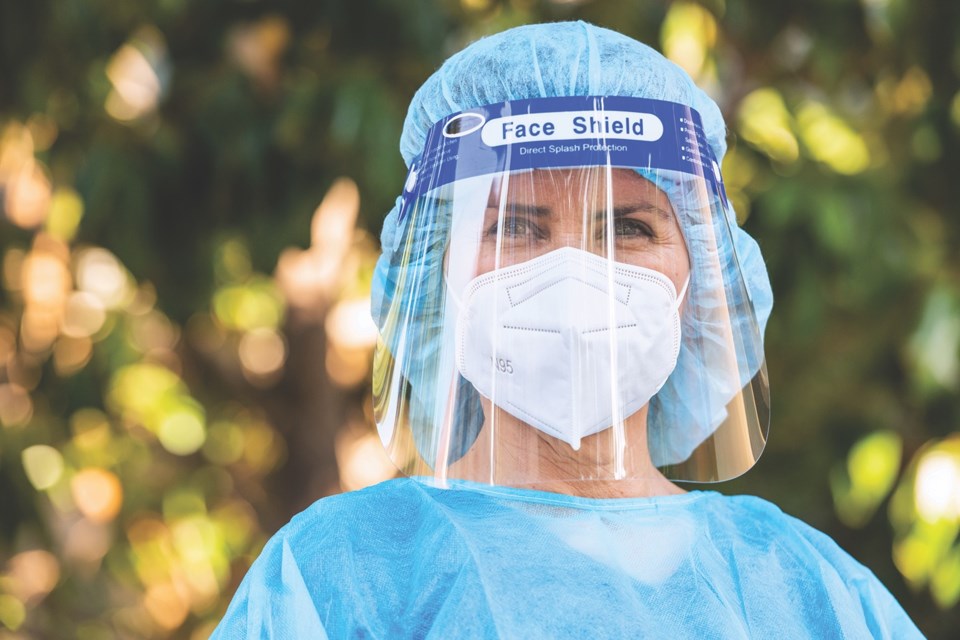EDMONTON - As the province endures the fourth wave of COVID-19, front-line health care workers are being pushed past the breaking point, say union officials.
"Nurses today are defeated and morally injured," said Rochelle Walker, president of the United Nurses of Alberta - Local 33. "They are seeing colleagues experiencing PTSD in real time. It's all too much and I don't know if I can even capture the injury that is occurring."
The vice-president of the Alberta Union of Provincial Employees (AUPE) echoes similar concern for the health care support workers they represent.
"Our members say they are physically and mentally burned out," said Susan Slade. "I have never seen morale so low or the level of anger so high."
Walker says the number of nurses who've left their jobs since the start of the pandemic is 'significant'. Slade added, "I know some Licensed Practical Nurses (LPNs) are looking for employment opportunities elsewhere, including the U.S."
Protests by anti-vaxxers outside hospitals across Alberta (and the country) haven't helped with morale for frontline workers either. Gil McGowan, president of the Alberta Federation of Labour (which represents 175,000 unionized Alberta nurses, paramedics, firefighters and other front-line workers), said "we support the right of all Canadians to protest, but we are horrified these people would choose to protest outside hospitals, where health care workers are struggling physically and psychologically to cope with a fourth wave that is threatening to overwhelm our health care system."
A 58-year-old nurse who left her full-time position at a hospital in a small Alberta city earlier this year said, "It was easy to go because I wanted to leave that toxic, horrible situation."
The nurse, who had worked in hospitals for almost three decades and now works for a private company, says she can't be identified because she continues to work one shift a month at the same hospital due to an ongoing union issue.
Describing how low morale and difficult working conditions prompted her to give her notice last January, the nurse said "it affected my mental health and my family life. My husband and I broke up due to my job. This is happening to a lot of us."
Though she contracted COVID-19 late in 2020 but had only mild symptoms, the long-time healthcare worker says her biggest concern has been inexperienced nursing grads placed in positions "they should not be in."
Walker backs those claims, stating, "(Nurses) are working short all the time or working with colleagues that don't have the clinical competency or expertise to meet the needs of the patients."
Since returning for one 12-hour shift a month during 2021, the small-city nurse said problems have worsened.
"There is a complete lack of respect from management," she said, adding that co-workers are mandated to work overtime due to staffing shortages.
Though her casual status means she isn't forced to work when asked, the nurse said "Just the other day ten nurses called in sick and a text goes out looking for people to fill in. If no one fills in then the nurses there have to cover for them."
Slade says a similar crisis is occurring among support staff.
"Because of critical staff shortages, they are seeing vacations being cancelled and they are being forced to work overtime day after day," she said. "When they do get a day off, they are often phoned at home and asked to come back to work."
"People should be very scared," warned the nurse. "You need to have your mind clear and free to make decisions to save someone's life. You are taking care of people and their lives are in your hands."
Both unions are in contract disputes. AUPE says Alberta Health Services (AHS) wants to cut pay for 11,000 health-care support staff by four per cent while the United Nurse of Alberta is seeking mediation with the province to settle a contract dispute for the 30,000 nurses it represents.
An AHS official did not respond to an emailed request for comment.
Read more from AlbertaPrimeTimes.com



